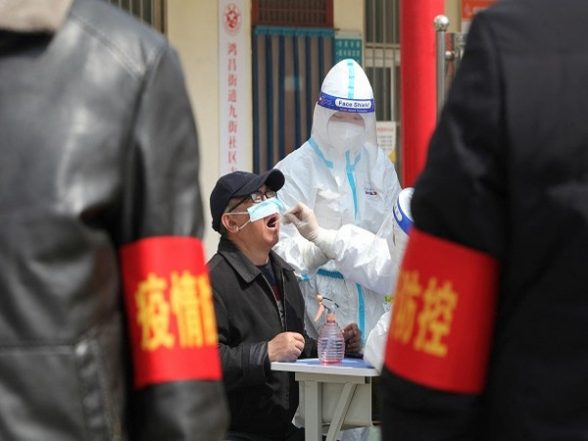[ad_1]
Beijing [China], May 28 (ANI): China abruptly dropped its “zero Covid” policy in December amid surging infections and public anger over the lockdown. Covid cases are on the rise again, but this time the country appears determined to get on with normal life as the government focuses on reviving economic growth, according to The New York Times.
While other countries have long been accustomed to this model, it is a transformation for China. Until late last year, its national leadership was prepared to lock down entire communities and regions, and even cities, to stamp out sometimes only small clusters of cases.
The New York Times is a daily newspaper headquartered in New York City with a global readership.
Chinese health authorities have reported an increase in COVID-19 cases since April, especially from new subtypes that are spreading globally. Zhong Nanshan, a prominent doctor who was the first to publicly demonstrate in early 2020 that the virus spreads easily among people, estimated earlier this week that as many as 65 million people could be infected with the virus each week across China by late June.
That would be higher than the 40 million weekly infections he estimated in late May. According to the New York Times, China no longer regularly releases official national infection estimates.
In contrast, new infections in China reportedly peaked at 37 million per day after “zero-Covid” control measures were lifted in December.
Even if, as Zhong acknowledges, the rate at which infections rise is fraught with uncertainty, a rebound is always a possibility, and many in China seem ready to endure the background buzz of Covid infections, according to The New York Times. Sometimes even Covid death.
“People are so used to infection, they think it’s the norm in the post-coronavirus world,” Lin Zixian, 36, who works for a technology company in Beijing, said in a telephone interview. Chinese leader Xi Jinping still routinely wears a surgical mask when meeting people indoors.
But Lin said he and the rest of his family have stopped wearing masks in most public places, as have many Chinese, according to The New York Times.
Officials across China appear to be trying to prepare the population for rising infection rates, rather than reimposing strict controls that had exhausted the public’s patience by the end of last year.
Since abandoning strict restrictions on domestic travel, the government has turned to restoring growth and job creation. Unemployment among urban youth of around 20% appears politically more pressing than rising Covid numbers, according to The New York Times.
Health officials in Beijing recommend wearing masks on buses and subways, but they are not mandatory and many passengers, especially young people, do not wear them. While the recent increase in cases may be putting pressure on hospitals, many people seem to prefer to live with the illness at home rather than going to fever clinics.
For many young patients, infection can mean a week or so of fever and other symptoms. In recent weeks, people have documented their symptoms on social media, often in a caustic, resigned tone.
Even more problematic are older adults, many of whom have not had COVID-19 and may not have been fully vaccinated. Among recent infections, as many as three-quarters of Chinese people were uninfected in the first wave, Zhang Wenhong, director of the Infectious Disease Center at Huashan Hospital in Shanghai and a leading spokesman for China’s response to the coronavirus outbreak, said in a report. . Recently, Chinese media accepted an interview with the New York Times.
China should increase vaccination rates, especially among the elderly; upgrade its indigenous vaccines to better protect against new variants; allow the introduction of internationally developed vaccines; and make antiviral drugs cheaper and more accessible to Covid patients, experts say.
This news article was written by Chris Buckley for The New York Times. He is the chief China correspondent for The Times and has lived in China for the better part of the past 30 years after growing up in Sydney, Australia. (Arnie)
(This is an unedited and auto-generated story from a Syndicated News feed, the content body may not have been modified or edited by LatestLY staff)
share now
[ad_2]
Source link



